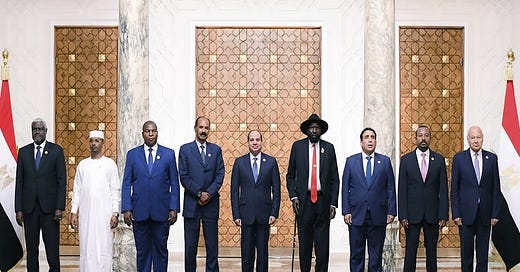Sudan’s neighbors might not be able to stop its slide into a full-scale civil war that sparks the next “African World War”, but it wouldn’t be from lack of sincerely trying.
The quarter-year-long Sudanese Crisis poses the greatest risk in years of another so-called “African World War” along the lines of the two erstwhile Congolese ones due to the competing interests of neighboring nations. This conflict’s immediate trigger was the rivalry between the Sudanese Armed Forces’ (SAF) General Abdel Fattah Al-Burhan and the Rapid Support Forces’ (RSF) General Mohamed Hamdan Dagalo (“Hemedti”), but its true roots stem from Western meddling as explained in the following analyses:
* 16 April: “Sudan’s ‘Deep State’ War Could Have Far-Reaching Geostrategic Consequences If It Continues”
* 21 April: “Here’s Why The US Is Trying To Pin The Blame For Sudan’s ‘Deep State’ War On Russia”
* 23 April: “A Senior Pentagon Official Strongly Implied Impending ‘Mission Creep’ In Sudan”
* 27 April: “Russia Is Right: ‘Political Engineering’ From Abroad Is Responsible For The Sudanese Crisis”
* 4 May: “The Mainstream Media’s Admissions That American Meddling Ruined Sudan Are Misleading”
* 6 May: “Five Takeaways From The Newly Commenced Saudi-US Peace Process For Sudan”
The Sudanese Crisis has stayed contained to that country’s borders so far, notwithstanding the outflow of refugees, mostly due to three factors: 1) Burhan didn’t play the “Russian card” that American media handed him to formally request foreign military support on that pretext; 2) Egypt restrained its impulse to directly intervene even after the RSF fought its SAF allies to a stalemate; and 3) the US doesn’t have any stockpiles left to send Burhan after the NATO-Russian proxy war in Ukraine depleted them.
Nevertheless, the joint Saudi-US peace process failed to make any progress and UN General Secretary Antonio Guterres warned early last week that recent clashes have “pushed Sudan to the brink of a full-scale civil war, potentially destabilizing the entire region.” The SAF-led Khartoum government then refused to participate in the Intergovernmental Authority on Development’s (IGAD) proposed talks and rejected their idea to deploy peacekeepers after accusing Kenya of bias towards the RSF.
The emerging military-strategic dynamics could have pushed events back towards the “African World War” scenario that was feared at the onset of this conflict in mid-April had Egypt not diplomatically intervened to host the leaders of every Sudanese-neighboring country in Cairo on Thursday. This importantly included Ethiopia, who Egypt previously accused of supporting the TPLF and with whom it’s embroiled in a fierce dispute over the Grand Ethiopian Renaissance Dam.
Egyptian President Abdel Fattah El-Sisi’s invitation to Ethiopian Prime Minister Abiy Ahmed and the latter’s acceptance can therefore be seen as mutual goodwill gestures proving their shared interests in stabilizing Sudan. Those two and their counterparts all agreed to an eight-point statement aimed at ending the conflict, which can be read in full at the bottom of this news article here. The most important of these was establishing a Foreign Ministers’ mechanism for managing the crisis gong forward.
Despite Prime Minister Abiy saying that the Jeddah and Cairo processes “need to align with the IGAD-led and African Union-supported, existing initiative”, the aforesaid development is still positive since it was agreed to by all of Sudan’s neighbors. This is the first time that they’ve come together over this crisis, which makes this new peace track much more meaningful than the two prior ones, especially since it’ll be followed up by more talks.
Furthermore, their joint statement also stresses that there shouldn’t be any external interference in this conflict. Whether or not all parties abide by that pledge remains to be seen, but it officially signaled that they’re disinterested in fighting a divide-and-rule proxy war, at least for now. The significance of this consensus can’t be overestimated since it shows that Sudan’s neighbors understand how mutually disadvantageous that would be, thus making it more difficult for them to be manipulated into doing so.
That’s not to say that the worst-case scenario of another “African World War” is no longer a concern, but just that there’s finally a mechanism for bringing together the most direct stakeholders in this conflict, which could be used to help them defuse bilateral tensions and mitigate their security dilemmas. This can in turn preempt unilateral action by one party risks leading to a chain reaction from everyone else that ends up bifurcating them into competing blocs just like what happened during the Congolese Wars.
All of Sudan’s neighbors have an interest in that even though Egypt is already suspected of providing some level of military-logistical-intelligence support to the SAF, but whatever it might have given them up until this point wasn’t game-changing as proven by the present stalemate. In the event that there’s some truth to those rumors, then Cairo might have exercised caution precisely to avert the possibility of other countries supporting the RSF in response if Egyptian aid started making a major difference.
Speculation aside, what’s indisputable is that Egypt doesn’t want the conflict to escalate any further, which is why it invited the leaders of every Sudanese-neighboring country to its capital to discuss the best way forward for their broader region. President Sisi deserves praise for this no matter what one thinks about any of his other policies. He might not be able to stop Sudan’s slide into a full-scale civil war that sparks the next “African World War”, but it wouldn’t be from lack of sincerely trying with his peers.




